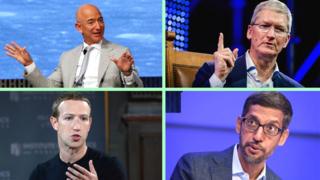 Image copyright
Image copyright
Getty Photographs/EPA/Reuters
Amazon’s Jeff Bezos, Apple’s Tim Prepare dinner, Facebook’s Mark Zuckerberg and Google’s Sundar Pichai defended their corporations
A report backed by Democratic lawmakers has urged variations that could guide to the split-up of some of America’s largest tech corporations.
The recommendation follows a 16-thirty day period congressional investigation into Google, Amazon, Facebook and Apple.
“These companies have way too significantly electric power, and that electric power will have to be reined in,” Democratic lawmakers functioning on the probe wrote.
But Republicans concerned in the hard work did not agree with the tips.
In a statement, 1 Republican congressman Jim Jordan dismissed the report as “partisan” and reported it state-of-the-art “radical proposals that would refashion antitrust legislation in the eyesight of the much remaining.”
Some others have explained they help numerous of the report’s conclusions about the firms’ anti-competitive methods but that therapies proposed by Democrats go far too much.
“Antitrust enforcement in Massive Tech marketplaces is not a partisan issue,” explained Republican Ken Buck. “But an ounce of avoidance is really worth a pound of cure—I would instead see specific antitrust enforcement around onerous and burdensome regulation that kills marketplace innovation.”
Monopoly electricity?
US tech businesses have confronted increased scrutiny in Washington above their dimension and electric power in the latest years. The investigation by the Property Judiciary Committee is just one particular of many probes corporations this kind of as Fb and Apple are experiencing.
The 449-page report, penned by committee staff, accused the businesses of charging substantial charges, forcing smaller buyers into unfavourable contracts and of working with “killer acquisitions” to hobble rivals.
“To set it simply just, organizations that once were being scrappy, underdog startups that challenged the standing quo have grow to be the types of monopolies we previous noticed in the period of oil barons and railroad tycoons,” it reported.
It said the findings need to prompt politicians to consider a collection of adjustments.
Individuals integrated more robust enforcement of current competitiveness law, as very well as modifications to restrict the areas in which a company may do organization or avert organizations from functioning as players in parts the place they are the dominant company of infrastructure – as Amazon does, for example, when it functions as both a vendor and market for other merchants.
This report is blockbuster.
It carries heft as well – it really is stacked with proof gathered about 16 months.
But the important point in this article is these are Democrat suggestions.
This is not a bi-partisan established of suggestions.
In fact, from what we’ve previously heard from Republicans numerous of the recommendations are “non-starters” for conservatives.
It can be also been claimed that some Republicans had been angered by omissions in the report.
Republicans required sections on alleged anti-conservative bias – which was apparently blocked by Democrats.
There are, nevertheless, Republicans who want to come across popular ground on antitrust.
For example, Republican Ken Buck has indicated he’d aid some of the suggestions. For example, shifting the anti-competitors stress of proof for acquisitions – earning it much more challenging to get up the competitiveness.
In real truth however, we’re not likely to see any concrete legislative proposals till immediately after the election.
But what is now crystal distinct is equally Biden and Trump – in their very own distinct means – present existential difficulties to the electrical power of Large Tech.
‘Fringe notions’
In testimony in advance of the committee in July, the bosses of tech companies defended their steps.
On Tuesday, Amazon hit back again at what it described as “fringe notions of anti-have faith in” law, as levels of competition law is identified in the US.
“The actuality that 3rd parties possessing the possibility to provide correct along with a retailer’s items is the incredibly opposition that most added benefits consumers and has built the market model so profitable for 3rd-occasion sellers”, the business reported in a blog publish.
Divisions in Washington concerning Republicans and Democrats make the prospective customers of major action towards the firms unlikely, tech analyst Dan Ives of Wedbush Securities mentioned.
“The absence of consensus and divergence between both of those sides of the aisle on the antitrust concerns continues to be a major difficulty to go points forward,” he claimed.
Although that could modify if Democrats achieve more electric power in the upcoming US election, he mentioned, “In spite of the report/material and framework for tips all around Massive Tech players (e.g. M&A, enterprise practices) devoid of main legislation variations we imagine this antitrust momentum hits a brick wall.”
In reaction, Fb claimed in a statement: “Instagram and WhatsApp have arrived at new heights of success because Facebook has invested billions in people firms.
“A strongly competitive landscape existed at the time of both acquisitions and exists nowadays. Regulators carefully reviewed each deal and rightly did not see any explanation to stop them at the time.”
What did the report say?
- Facebook experienced “monopoly power” in the current market for social networking, which it maintained by working with its details edge to “obtain, duplicate or kill” nascent threats.
- Google monopolised on-line look for and advertising and marketing employing “a series of anti-aggressive tactics”, such as privileging its personal articles ahead of other sites.
- Amazon possessed “important and durable sector energy” in on the web shopping, which it furthered in aspect by “anticompetitive conduct in its treatment of third-bash sellers” which it referred to as “inside rivals” behind shut doors.
- Apple exerted monopoly electric power through its App retailer,which it leveraged “to make and implement boundaries to competition and discriminate against and exclude rivals although preferencing its have choices”.




More Stories
Twitter Marketing – Using Twitter to Market Your Business
Is a Low-Cost Franchise Right For Me?
Online News